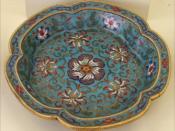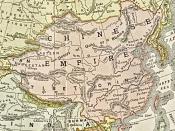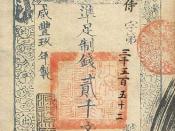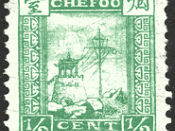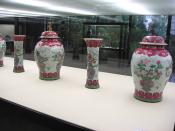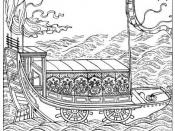Though many of us may feel like times are difficult now, there are a select batch of us who know that this is nothing compared to what some of the pain in the past was like. Those who have read and studied history carefully know that the people of the past have dealt with a lot more hardships and pain than we can possibly ever imagine nowadays. This can especially be seen in both Liu's The Travels of Lao Ts'an and Wu's The Sea of Regret. It is true that during the Qing Dynasty, corruption in all ranks of society existed, but its terrible affect on the people is what poses more of an interest. In both these novels, the pain and the desire for a change can be avidly seen, and the way it is expressed, is not only subtle, but clever.
In both novels, the corruption in the population and the government can be directly viewed through the fact that higher positions can easily be obtained.
In Liu's The Travels of Lao Ts'an, the reader can experience the corruption through the main characters' adventures. Even in the very beginning, you can see that there is corruption on the boat. Even in danger, each person is out to look only after themselves. And excellent example of this was when one of the passengers starting making a passionate speech about how they shouldn't die, and that it is not worth dying. The passengers believe him, but in the end, it ended with the man only tricking the passengers into giving him money. The corruption is so high, that even the people who are victims, just simply give up, and in order to survive, they become a part of the corruption. That particular scene is also an interesting piece of symbolism. By posing Lao Ts'an as a civilian in a boat outside, looking into a cargo ship inside, it shows how helpless the civilians are at trying to change anything. This is Liu's way of expressing his discomfort on the corruption at the time. The reader can also tell that Lao Ts'an's way of rational thinking symbolizes the way things should be, but can't, because of the thought process of the people at the time.
By subtly showing it, he can get away with it, while at the same time be able to show how he really feels about China at the time. Both novels were subtle in showing their distaste and grief. Both novels would seem pretty modern, especially to a modern reader, but with further research, the audience would be pretty surprised to understand that this is written during the late 1800's. Both novels have a modern flair, some tainted with a lot of emotional descriptions, such as Wu's The Sea of Regret, some with a lot of technological and scientific aspects, such as Liu's The Travels of Lao Ts'an. Both of these aspects are pretty rare to find in any piece of writing at the time, for they were in such a forward and audacious manner. At the time, most pieces of literature were more withdrawn, with rarely any first person narration or any pure emotions shown. By writing this way, both authors placed themselves in great risk of endangering their lives and their reputations.
The roles that women had in these two novels were pretty significant. In Liu's The Travels of Lao Ts'an, the author seems to praise women, and the sympathy shown towards woman was something special and not found in other novels of its time. For example, in chapter 9, around pages 96 to 99, Tzu-p'ing has the most "inspiring and intellectual" conversation with Yu Ku. The reader can find this to be pretty intriguing for at the time, women weren't even in any sort of high regard. On the other hand, the women in Wu's The Sea of Regret seem to be pretty repressed and weak, making the moral of both the stories address different isues, with Wu focusing on the affect on the civilians, and Liu focusing on both the civilians and the political corruption.
Sympathy doesn't seem to be prevalent in the story, but in Liu's novel, there is most definitely a sign of sympathy. Lao Ts'an's pity on the prostitute is most definitely a different view, especially coming from a man. At the time, men looked down upon women and viewed them mainly as their slaves or as their servant. To place women at such a high rank makes this novel quite exquisite.
Both novels definitely show the author's desire to change certain "daily routines" that they had to go through everyday and their methods of showing this is quite incredible and daring. For novels written at the time were pretty bland, and pretty reclusive in emotion. Yet both of these novels are emanating fervor and emotional language. After having read these, any reader can see as to why they are such a classic, and in some ways, see how they had helped in changing the way the corruption went. All in all, both author's distinctive style enables each of them to convey their own individual message.
